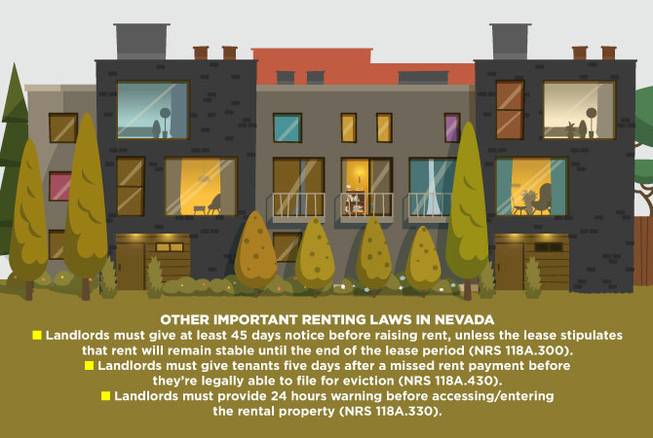
Monday, Oct. 16, 2017 | 2 a.m.
By Attorney Xenophon Peters, Esq., Partner, Peters and Associates, LLP
Question: I’m new to the city and looking for a home to rent. What do I need to know about renters’ rights in Las Vegas before I sign a lease?
Answer: The main pillars of landlord-tenant laws come down to the responsibilities of both parties. Landlords are required to provide safe and habitable housing for tenants; tenants are required to cooperate with the landlord and maintain the housing in good condition. However, this is simply the basic premise — there are many important laws renters should know.
The lease or rental agreement must be in writing and include information about the terms of the contract, including the rental amount, frequency of payment, payment conditions and deposit guidelines. It should also outline what happens once the lease ends or is terminated for any reason.
Additionally, the landlord is required to disclose any significant information to the tenant, which is typically included in the lease/rental agreement. Specific information that needs to be disclosed includes a move-in checklist, the purpose of any relevant deposits/fees and the conditions of the deposit return.
Security deposits
It’s common for landlord/tenant disputes to arise over the security deposit return. The security deposit you put down can only be used in three ways:
1. To remedy any default in rent payments (i.e., if you skip out on the last month’s rent, the landlord can deduct that amount from your security deposit)
2. To pay for repairing damages, other than normal wear and tear
3. To clean the dwelling once you move out
What’s considered “normal wear” and what’s considered “damage” can be debated — and often is during disputes — but generally “normal wear” includes things like faded paint, worn floors, small nicks/stains/marks and a few small nail holes in the walls. Alternately, large stains that cannot be cleaned, broken tiles, burns, pet stains and many large holes that require patching/repainting are considered damage.
Once you move out, the landlord is required to pay back your security deposit, or whatever is left from it, within 30 days (NRS 118A.242). If they deduct anything from it, they must give you an itemized list of what that money went toward.
Safe and habitable dwelling standards
There are a few essential services that the property landlord/owner must maintain, such as heating, air conditioning, running water, electricity, gas, sewer and lockable doors. If any of these essential services are hindered or in a state of disrepair, the landlord has to correct the issue in a timely manner. Nevada law requires the problem to be fixed, or at least for satisfactory progress to be made toward a solution, within two business days (NRS 118A.380).
Keep in mind, the landlord’s requirement to maintain essential services only pertains to what is in his or her control. The tenant has no right to take action against the landlord if the problem was caused deliberately or by the tenant’s own negligence. For example, this means that if the air conditioning unit suddenly stops working because the compressor malfunctions, it’s the landlord’s responsibility to replace it. If it stops working because the tenant fails to pay the utility bills and the power company turns off the electricity, that’s on the tenant.
Landlords have 14 days to fix nonessential problems (NRS 118A.355), including small repairs such as broken sprinklers or a loose hinge on a bedroom door.
If you’ve notified your landlord about a problem, whether it’s essential or nonessential, and it’s not corrected within the legal timeframe, you have a few options. One is to pay for the repair yourself and deduct the cost from the next month’s rent (if you go this route, provide copies of any relevant documentation, such as receipts and work orders). Another option may be to withhold rent until the problem is remedied. In some cases, you may also be able to simply terminate the lease and move out. If none of these options is viable, you may also be able to sue the landlord for the cost of repairs and/or for violating the terms of your lease.
Landlord/tenant disputes
If you have an essential services dispute, you’ll need to start by filing a complaint with the Southern Nevada Health District. The agency can send an inspector to document the housing conditions and notify the landlord of the formal complaint. If no action is taken from there, you can contact an attorney to discuss your options. Oftentimes, these disputes can be settled, but they may also qualify for district court or small claims court.
Other important renting laws in Nevada
Landlords must give at least 45 days notice before raising rent, unless the lease stipulates that rent will remain stable until the end of the lease period (NRS 118A.300).
Landlords must give tenants five days after a missed rent payment before they’re legally able to file for eviction (NRS 118A.430).
Landlords must provide 24 hours warning before accessing/entering the rental property (NRS 118A.330).
°°°
If you have a question you’d like to see answered by an attorney in a future issue, please write to [email protected] or visit PandaLawFirm.com.
Please note: The information in this column is intended for general purposes only and is not to be considered legal or professional advice of any kind. You should seek advice that is specific to your problem before taking or refraining from any action and should not rely on the information in this column.


Join the Discussion:
Check this out for a full explanation of our conversion to the LiveFyre commenting system and instructions on how to sign up for an account.
Full comments policy